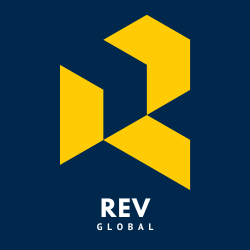In an era marked by geopolitical tension, digital sovereignty, and fractured supply chains, the age of globalized centralization is giving way to something new: intentional fragmentation.
For mid-sized businesses, this isn’t just a geopolitical shift—it’s a strategic wake-up call.
At REV Global, we see a growing need for decentralized infrastructure—not as a contingency, but as a competitive advantage that drives agility, enterprise value, and future-ready exit strategies.
🧭 What Is Fragmentation—and Why Should Mid-Sized Firms Care?
From strained U.S.-China trade relations to regulatory crackdowns on data sovereignty in the EU and beyond, businesses are navigating a world where “one-size-fits-all” no longer applies.
Fragmentation is reshaping how companies:
-
Manage supply chains
-
Store and secure data
-
Allocate capital
-
Pursue M&A opportunities
Centralized models = risk. Decentralized systems = resilience.
🧩 Modular Systems = Strategic Value
Modular, distributed infrastructures allow firms to:
-
Localize operations to match regional policies and taxes
-
Isolate risk across geographies or business units
-
Scale faster, with interchangeable digital and physical components
-
Attract acquirers looking for flexibility and market adaptability
Whether it’s cloud architecture, production facilities, or talent deployment, decentralization helps modern firms stay agile and acquisition-ready.
🤖 The AI Layer: Smart Decentralization
Artificial Intelligence is the backbone of this shift—making decentralized systems intelligent, efficient, and adaptive.
Here’s how AI accelerates the model:
-
Predictive logistics optimize regional supply chain nodes
-
AI-driven risk analysis enhances decision-making across fragmented markets
-
Decentralized AI agents enable faster automation at the edge
-
Customizable AI models meet regional compliance (think: GDPR vs. CCPA)
At REV Global, we help mid-sized firms implement AI not just as a tool—but as a transformation layer that supports smarter, modular operations.
🌱 Opportunity Zones: Investing in Fragmentation-Ready Growth
As businesses decentralize, geography matters again—especially in the U.S., where Opportunity Zones 2.0 is opening the door for long-term, tax-advantaged expansion in rural and underserved markets.
Key OZ 2.0 advantages:
-
Permanent capital gains deferrals
-
30% basis step-up for rural investments
-
Lower development thresholds in distressed areas
-
Incentives for modular infrastructure and localized talent strategies
Mid-sized firms using Opportunity Zones as regional hubs can build decentralization into their growth while boosting valuation and community impact.
📈 What This Means for Exit Strategy
Buyers today aren’t just looking at top-line revenue—they’re assessing:
-
Operational risk exposure
-
Supply chain flexibility
-
Data compliance
-
Technological maturity
A decentralized, AI-powered firm with OZ-aligned growth strategy commands a premium—and is far better positioned for PE investment, acquisition, or IPO.
🔎 How REV Global Helps Mid-Sized Firms Adapt
ChallengeREV Global’s SolutionCentralized ops, high-risk exposureModular business design & AI-backed risk modelingOutdated tech stackDigital transformation playbooks customized for fragmented marketsLow enterprise valueCEPA-aligned value acceleration tied to resilience & infrastructurePoor regional positioningStrategic Opportunity Zone mapping & execution
🧠 Final Thought: Decentralization Isn’t Just Technical—It’s Strategic
The fragmented future isn’t something to fear—it’s a landscape full of opportunity, agility, and upside for those bold enough to adapt.
REV Global helps mid-sized firms modernize, modularize, and monetize—with AI, infrastructure, and exit-readiness built in.
📩 Want to learn how to de-risk and decentralize your business for resilience and ROI? Let’s talk. Contact REV Global for a personalized infrastructure & growth strategy session.

